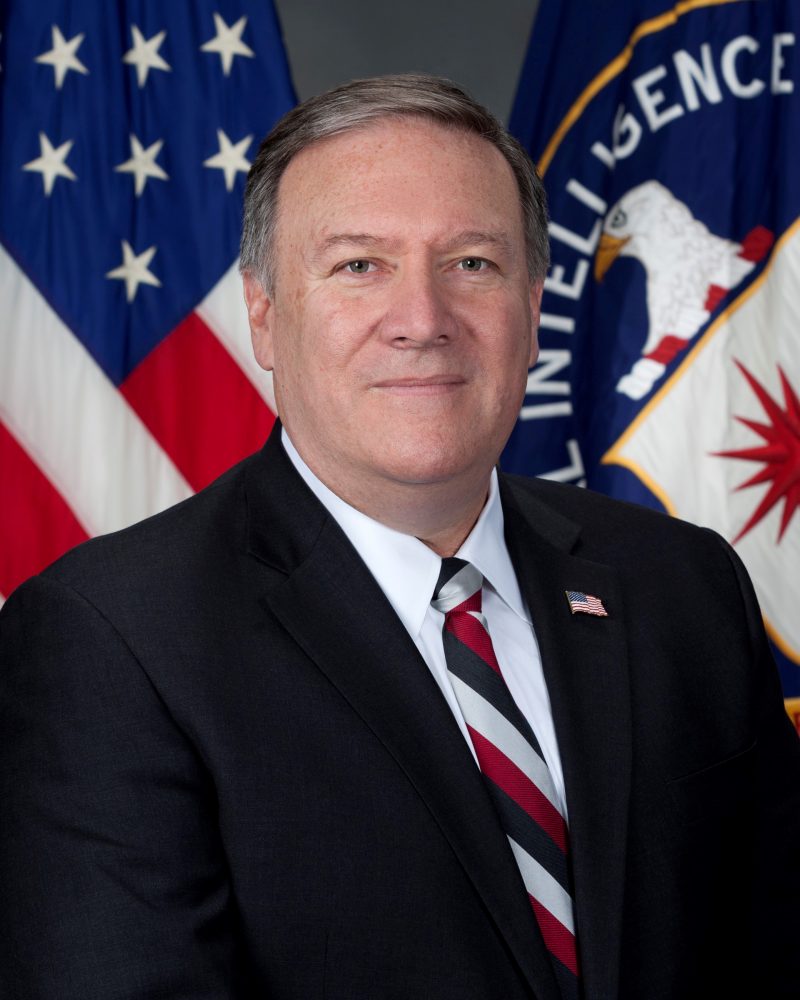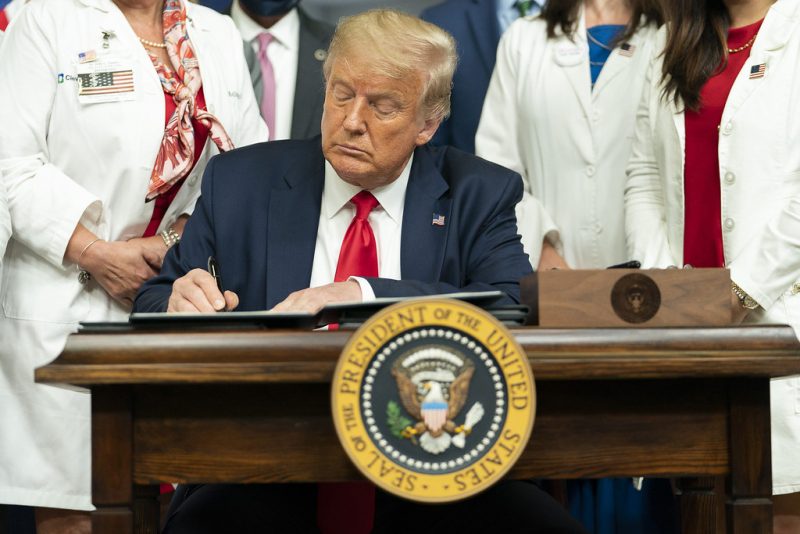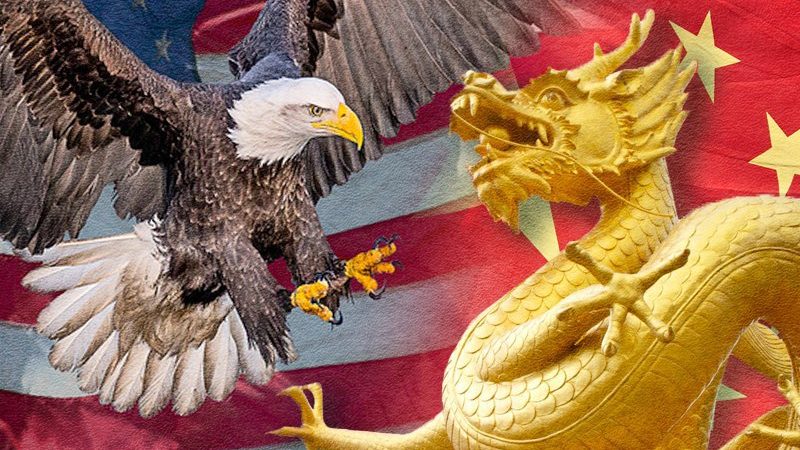Relations between Washington and Beijing continue to deteriorate. The last week was marked by two important events: first, Chinese diplomats left the Consulate General of China in Houston, which was closed at the request of the United States. On July 21, the United States authorities demanded that the consulate be closed, claiming that it had been used by Chinese hackers to steal data on the development of a vaccine against Covid-19.
The Chinese Foreign Ministry called the decision a political provocation and said it would retaliate. After that, the Chinese Foreign Ministry demanded that the US Consulate General in Chengdu, Sichuan Province, close.
On July 23, US Secretary of State Mike Pompeo announced the beginning of the Cold War with China. Speaking at the Richard Nixon Library he called Communist China a threat to the “Free World”.
Pompeo described China as the “new tyranny” and called for a new alliance of democratic states to counter the communist country.

All against China
We can state that the point of no return has been passed. Whoever becomes president of the United States in November 2020 will, in many ways, be hostage to the inertia gained over the past year.
Washington accuses Beijing of being responsible for the Coronavirus pandemic, human rights violations (in Hong Kong and Xinjiang) and technology theft. But it’s not just about these particular problems. The main reason that the US-Chinese confrontation is by its very nature finding new avenues for aggravation as the two countries are ultimately fighting for the future of the world.
The entire American elite – regardless of party affiliation and Trump’s sympathies or antipathies – now stand for a tough confrontation with Beijing. Indeed, accusations of a pro-Chinese position against the Democrats by Trump supporters are more likely to target an internal American audience, serving as a propaganda tool.
In fact, the bills aimed at countering China in all spheres, from economy to mass media and security, have enjoyed strong bipartisan support over the past three and a half years.
Not so long ago, in June, as Reuters reported “A bipartisan pair of U.S. senators…introduced legislation that would require Republican President Donald Trump to more systematically punish China for stealing US technology.”
The Senate unanimously passed a bipartisan bill that would put sanctions on Chinese officials over the law on security in Hong Kong. The Senators from both countries voted for funding Pacific Deterrence Initiative to counter China. In Michigan lawmakers from both US parties called China to pay for coronavirus damages.
President Trump and his main rival in the November elections – former vice president, Democrat Joe Biden – blame each other for their weakness towards China, promising voters a tougher stance.

The Democrats, for example, launched an advertisement on US television accusing Trump of relations with China.
“Trump said he would get tough on China,” a narrator says in the ad, “He didn’t get tough, he got played.”
The rival
The reason is that only China, alone or in alliance with other countries, can challenge US hegemony and finally bury that hegemony. China is the only one that can compete with the US economy by creating an infrastructure of alternative trade routes and directions for technological development. That is the foundation of China’s “Belt and Road Initiative” (BRI).
That is why the United States is fighting against Chinese credit systems and infrastructure projects, even while China owns about $1.1 trillion in US debt
It is this, not just industrial espionage, that is pushing the United States to press its European and British partners, as well as all countries that are somehow vulnerable to American blackmail, to force them to abandon the products of Chinese company Huawei, the world’s flagship 5G company.
And the American blackmail works. Not long ago, the British government reversed previous decisions that gave the Chinese company a key role in the development of 5G networks in the United Kingdom.
The strength of China now is money and innovation. It is these factors that led the US to the status of world leader after World War II. The US then offered cheap loans (such as the Marshall Plan as well as numerous grants and loans for Asia in the 1940-50s) and became an innovative leader, having overtaken much of the scientific potential of the Old World.
Now China can use the American secret of success to push the US off the pedestal as world leader. However, Beijing itself, due to significant cultural and social differences from Washington, cannot take its place and become a single world leader.
China has no ideology of exclusivity and no messianic idea comparable to the American one. What China calls for is a community with shared future for mankind, and implies multipolarity and “win-win cooperation” in contrast to the principle of free competition and struggle, which the Americans put in the spotlight.
Thus, the US fight against China is a fight against the outgrowing unipolar world with the multipolar one.
A necessary enemy
After the collapse of the Soviet Union, the United States lost its main selling point – an enemy. The presence of a major enemy that attempted to attack the foundations of the “American way of life” explained to ordinary Americans all the sacrifices they had to make, all the turmoil, all the wars, all the terrible distortions of the social system and the state, built in the interests of monopolistic capital, not workers.
Islamic radicalism was only partly suited to that role. Today’s China, a communist state, is ideal to play the role of America’s enemy in a new Cold War.
Americans, for whom competition, the struggle of all against all, and natural selection are key categories of consciousness (it is necessary to fight, the strongest – survives, and the loser is the most despicable creature in the world), psychologically can exist as a more or less successful society only in the fight against the enemy. Now, that enemy is China.
There are other considerations as to why the US is the initiator of the New Cold War. The New Cold War is needed to put pressure on the American companies that had previously exported their production to China. Now that China has the status of the number one enemy of the United States, the issue of returning the production lines to the United States, or at least on US-friendly territory, of all the industry exported to China over the past decades is on the agenda.
China is undertaking a large-scale rearmament program, primarily of its navy. The US will start confrontations until China’s military potential matches that of the United States. Then it will be too late.
Finally, a new common enemy, whose danger is recognized by both Democrats and Republicans, is a factor uniting the US population divided by President Trump and the racial and social imbalances that have resulted in mass violence and Black Lives Matter movement protests in the streets this year.
De-globalization and new fronts
One of the main consequences of the “New Cold War” will be the active deglobalization of the world. Countries will have to take a certain step towards this end anyway, responding to the coronavirus pandemic: supply chains must be shorter in order not to lead to a situation of large-scale deficit due to the closure of certain segments of the world transport infrastructure and entire countries. Countries must produce everything needed by themselves or deliver goods from nearby areas.
On the other hand, the US’ pressure on allies to abandon Chinese technology will inevitably mean that allies will not be able to get this technology anywhere else. They will perpetuate their technological backwardness and dependence on the United States. The choice between the United States and China is a choice between development and stagnation, not between “democracy” and its absence.
The world emerging in the New Cold War paradigm will be split into “trading blocs,” and protectionism in all its forms will become the main trend of economic policy. In geopolitics, this will result in the creation of new military blocs.
However, there is an obvious difference between the old Cold War and the new one: the US’ position. During the confrontation with the USSR, America was a young and aggressive center of power. Now, it is a shaky superpower that is giving up its positions and hopes to prolong its agony by challenging the world’s largest production center from the position of value-oriented geopolitics.
Ultimately, the US will extend its leadership position at the expense of its allied powers (primarily the EU and India), which will be cut off from potentially advantageous relations with China. For a full-fledged Cold War, the US needs a bloc of allies, which it will increasingly actively build. By forcing countries to make that choice, it will be possible to test their real loyalty. However, the question arises to what extent the leaders of these countries will be ready to change their development to reinforce American geopolitical ambitions.









Reconstitute SEATO